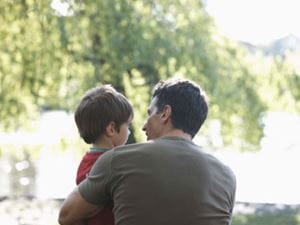
We lived in Brooklyn, NY for most of Caidin’s life. We moved when he was six (he’s now eight). Walking around the neighborhood was a daily activity. Although many people don’t realize it, NYC and it’s Boroughs are broken into little communities. You tend to shop, eat and mingle where you live and because of this you get to know quite a lot of people.
On a tree covered street in Brooklyn, there was a lovely old-time pharmacy. It was run by one man, not a giant conglomerate. The pharmacist knew everyone who walked through the door and if he didn’t, he’d know you before you left. He had the opportunity to see someone buy a pregnancy test and then come in for prenatal vitamins and eventually teething tablets, Band-Aids and anything else a new mom needs. When I went to pick up a prescription there was always a pleasant conversation.
One day, I went to pick something up and the pharmacist was talking about his son with another customer. The pharmacist was saying that every morning they had to fight with his four-year-old to get him to school. It had gotten so bad that their son’s uncooperative behavior was actually spilling into the evening before
Hearing this I said ‘have you asked him why he’s acting this way?’ I still remember the surprised look on the Pharmacist’s face and the deafening split second silence. He turned to me and said “I never thought to ask him. I thought he was just being cranky.”
I went on to share that from my experience when children are acting out, there is something bothering them. At this young age, they don’t know how to contextualize what’s going on, and they also don’t have the vocabulary to explain it, so our opportunity as parents is to help them figure it out.
I gave him one of the tools that I used with Caidin in these situations. When Caidin was four he sometimes could find it difficult to explain to me, but he never had a problem explaining to his giant stuffed Mickey Mouse (it was about the same size as Caidin) I would put Mickey on my lap, so that Caidin was looking at Mickey and not me and then I’d make Mickey talk. He would ask Caidin questions and Caidin would answer. We got to the bottom of a lot of interpersonal problems at school in this way. After Caidin would talk to Mickey, Mickey would then turn it back over to me to help Caidin figure things out. Caidin knew it was me and my voice, but for whatever reason, it was easier to sort things out when he was directing it at Mickey.
We can forget that little kids have the same kinds of experiences that we as adults have. What’s different is that for them these experiences are new. They haven’t been through it yet and they don’t know how to navigate through these experiences. Our opportunity as Conscious Parents, Conscious Teachers and Conscious Care-Givers is to recognize mood and behavioral changes and then when we do, try to help our children communicate. Sometimes they need help putting words to what they are experiencing and almost always they need information, insight, guidance and tools (strategies) to help them navigate.
Children may be small, but that’s all that’s little about them. I tend to think that they experience things, which we have come to take for granted, in a much more intense and overwhelming way because these experiences are all new.
When we see our children completely we recognize that life doesn’t start as a teenager, it starts from the minute we arrive. With our first breath (or maybe even before it) we begin our life long journey of making sense of the world we find ourselves in and then learning how to navigate it.
As Conscious Parents we get to help and support our kids from the very beginning. We get to help them find their voice, understand emotions, and to make choices that will help them be the best person they can be.
Beliefnet parenting expert Christine Argo shares her stories, insight, guidance, and information to support both parents and their children in her Life As a Conscious Mom blog.

